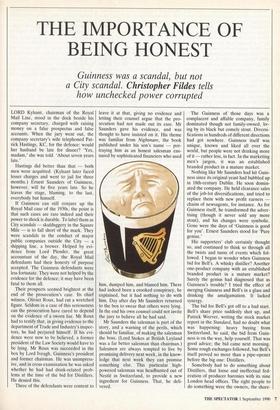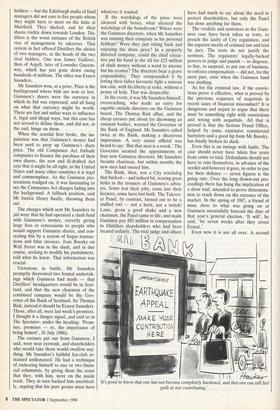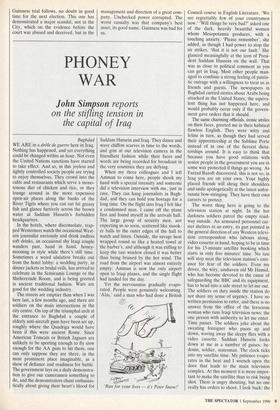THE IMPORTANCE OF BEING HONEST
Guinness was a scandal, but not
a City scandal. Christopher Fildes tells
how unchecked power corrupted
LORD Kylsant, chairman of the Royal Mail Line, stood in the dock beside his company secretary, charged with raising money on a false prospectus and false accounts. When the jury went out, the company secretary's wife telephoned Pat- rick Hastings, KC, for the defence: would her husband be late for dinner? 'Yes, madam,' she was told. 'About seven years late.'
Hastings did better than that — both men were acquitted. (Kylsant later faced lesser charges and went to jail for three months.) Ernest Saunders of Guinness, however, will be five years late. So he leaves the stage, blaming, to the last, everybody but himself.
If Guinness can still conjure up the Royal Mail case of the 1930s, the point is that such cases are rare indeed and their power to shock is durable. To label them as City scandals — skulduggery in the Square
Mile — is to fall short of the mark. They
were scandals in the conduct of major public companies outside the City — a shipping line, a brewer. Helped by evi- dence from Lord Plender, the great accountant of the day, the Royal Mail defendants had their honesty of purpose accepted. The Guinness defendants were less fortunate. They were not helped by the evidence for the defence; it may have been fatal to them all.
Their prospects seemed brightest at the end of the prosecution's case. Its chief witness, Olivier Roux, had cut a wretched figure. Seldom in a case of this seriousness can the prosecution have cared to depend on the evidence of a sworn liar. Mr Roux had to testify that, in giving evidence to the department of Trade and Industry's inspec- tors, he had perjured himself. If his evi- dence were now to be believed, a former president of the Law Society would have to be lying. Mr Roux was succeeded in the box by Lord Iveagh, Guinness's president and former chairman. He was unimpress- ive, and in cross-examination he was asked whether he had had drink-related prob- lems at the time of the bid for Distillers. He denied this.
Three of the defendants were content to
leave it at that, giving no evidence and letting their counsel argue that the pro- secution had not made out its case. Mr Saunders gave his evidence, and was thought to have insisted on it. His theme was familiar from Nightmare, the book published under his son's name — por- traying him as an honest salesman ens- nared by sophisticated financiers who used
him, dumped him, and blamed him. There had indeed been a crooked conspiracy, he explained, but it had nothing to do with him. Day after day Mr Saunders returned to the box to swear that others were lying. In the end his own counsel could not invite the jury to believe all he had said.
Mr Saunders the salesman is part of the story, and a warning of the perils, which should be familiar, of making the salesman the boss. (Lord Stokes at British Leyland was a far better salesman than chairman.) Salesmen are always tempted to live by promising delivery next week, in the know- ledge that next week they can promise something else. This particular high- powered salesman was headhunted out of Nestle in Switzerland, to provide a new ingredient for Guinness. That, he deli- vered. The Guinness of those days was a complacent and affable company, family dominated though not family-owned, liv- ing by its black but comely stout. Diversi- fications in hundreds of different directions had got nowhere. Guinness itself was unique, known and liked all over the world, but people were not drinking more of it — rather less, in fact. In the marketing men's jargon, it was an established branded product in a mature market.
Nothing like Mr Saunders had hit Guin- ness since its original yeast had bubbled up in 18th-century Dublin. He soon domin- ated the company. He held clearance sales of the job-lot diversifications, and tried to replace them with new profit earners chains of newsagents, for instance. As for Guinness itself, he transformed the adver- tising (though it never sold any more stout), and his changes were symbolic. Gone were the days of 'Guinness is good for you'. Ernest Saunders stood for 'Pure genius.'
His supporters' club certainly thought so, and continued to think so through all the twists and turns of events which fol- lowed. I began to wonder when Guinness bid for Bell's. A whisky distiller? Another one-product company with an established branded product in a mature market? Surely the genius had diagnosed that as Guinness's trouble? I tried the effect of merging Guinness and Bell's in a glass and drinking the amalgamation. It lacked synergy.
The bid for Bell's got off to a bad start. Bell's share price suddenly shot up, and Patrick Weever, writing the stock market
report in the Standard, had no doubt what was happening: heavy buying from
Switzerland, he said, the bid from Guin- ness is on the way, help yourself. That was good advice; the bid came next morning.
Some rough exchanges followed, but Bell's itself proved no more than a pipe-opener before the big one: Distillers.
Somebody had to do something about Distillers, that loose and ineffectual fed- eration of producer baronies with its nine London head offices. The right people to do something were the owners, the share- holders — but the Edinburgh mafia of fund managers did not care to fire people whom they might have to meet on the links at Muirfield. They ducked, and let their shares trickle down towards London. Dis- tillers is the worst instance of the British vice of management by takeover. That system in fact offered Distillers the choice of two managers, at the heads of the two rival bidders. One was James Gulliver, then of Argyll, later of Lowndes Queens- way, which has just gone down owing hundreds of millions. The other was Ernest Saunders.
Mr Saunders won, at a price. Price is the battleground where bids are won or lost. Guinness's shares were the currency in which its bid was expressed, and all hung on what that currency might be worth. There are fair and unfair ways to influence it, legal and illegal ways, but this case has not served to define them, and did not, in the end, hinge on them.
When the scandal first broke, the im- putation was that Guinness's money had been used to prop up Guinness's share price. The old Companies Act forbade companies to finance the purchase of their own shares, the new and ill-drafted Act says that it might be all right, in the United States and many other countries it is legal and commonplace. As the Guinness pro- secutions trudged on, it was fascinating to see the Companies Act charges fading into the background. A fallback position, said Mr Justice Henry finally, throwing them out.
The charges which sent Mr Saunders to jail were that he had operated a slush fund with Guinness's money, covertly giving large fees or concessions to people who would support Guinness shares, and con- cealing this by a system of bogus transac- tions and false invoices. Ivan Boesky on Wall Street was in the slush, and in due course, seeking to modify his punishment, told what he knew. That information was crucial.
Victorious in battle, Mr Saunders promptly disavowed two formal undertak- ings which Guinness had made — that Distillers' headquarters would be in Scot- land, and that the new chairman of the combined company would be the Gov- ernor of the Bank of Scotland, Sir Thomas Risk; instead it should be Ernest Saunders. Those, after all, were last week's promises. I thought it a danger signal, and said so in The Spectator, under the heading: 'Prom- ises, promises — or, the importance of being honest', 26 July 1986).
The excuses put out from Guinness, I said, were neat eyewash, and shareholders who would take them would swallow any- thing. Mr Saunders's faithful fan-club re- mained undismayed. He had a technique of endearing himself to one or two finan- cial columnists, by giving them the sense that they, with him, were on the inside track. They in turn backed him uncritical- ly, arguing that his pure genius must have whatever it wanted.
If the watchdogs of the press were silenced with bones, what silenced the watchdogs of the boardroom? Where were the Guinness directors, when Mr Saunders was running their company as his personal fiefdom? Were they just sitting back and enjoying the share price? In a properly directed company, could the chief execu- tive put his hand in the till for £25 million of slush money without a word to anyone but his cronies? The directors bear a grave responsibility. They compounded it by letting their fallen favourite fight a ruinous law case, with his liberty at stake, without a penny of help. That was despicable.
In the event, it was Mr Saunders himself, overreaching, who made an entry for capable outside directors on the Guinness board. The Thomas Risk affair, and the cheap excuses put about for disowning an eminent banker, worried the Governor of the Bank of England. Mr Saunders called twice at the Bank, making a disastrous impression. A very senior official was heard to say: 'But that man is a crook.' The Governor secured the appointments of four new Guinness directors. Mr Saunders became chairman, but within months the new men had ousted him.
The Bank, then, was a City watchdog that barked — and indeed bit, tearing great holes in the trousers of Guinness's advis- ers. Some lost their jobs, some lost their licences, some have lost both. The Takeov- er Panel, by contrast, turned out to be a stuffed owl — not a hoot, not a twitch! Later, given a good shake and a new chairman, the Panel came to life, and made Guinness pay £85 million in compensation to Distillers shareholders who had been treated unfairly. The trial judge and others have had much to say about the steed to protect shareholders, but only the Panel has done anything for them.
The verdicts and sentences in the Guin- ness case have been taken as texts, to preach the laxity of City regulation, and the superior merits of criminal law and trial by jury. The texts do not justify the sermons. The regulators' legally-backed powers to judge and punish — to disgrace, to fine, to suspend, to put out of business, to enforce compensation — did not, for the most part, exist when the Guinness fund was slushing.
As for the criminal law, if the convic- tions prove it effective, what is proved by the previous sequence of acquittals in recent cases of financial misconduct? It is dangerous and unjust to argue that there must be something right with convictions and wrong with acquittals. All that is proved is that the Serious Fraud Office, helped by some expensive commercial banisters and a good tip from Mr Boesky, has finally broken its duck.
Even this is an innings with faults. The case should never have taken five years from crime to trial. Defendants should not have to ruin themselves, in advance of the verdict and however it goes, in order to pay for their defence — seven figures is the going rate. Over the long drawn-out pro- ceedings there has hung the implication of a show trial, intended to prove determina- tion to crack down on the excesses of the market. In the spring of 1987, a friend of mine close to what was going on at Guinness successfully forecast the date of that year's general election. 'It will', he said, 'be seven weeks after they arrest Ernest.'
Even now it is not all over. A second ' It's good to know that one has not become completely hattlened, and that one can still feel
Guinness trial follows, no doubt in good time for the next election. This one has demonstrated a major scandal, not in the City, which on the evidence before the court was abused and deceived, but in the management and direction of a great com- pany. Unchecked power corrupted. The worst casualty was that company's best asset, its good name. Guinness was bad for us.




















































 Previous page
Previous page